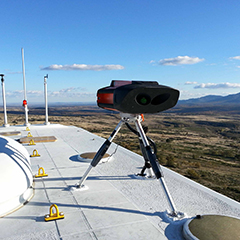First Wind, an independent U.S.-based renewable energy company, has purchased a Wind Iris Lidar to optimize the performance of its wind turbines. The decision resulted from a successful field trial that used data from the nacelle-mounted Lidar to correct yaw error and increase total energy production.
First Wind wanted to improve the yaw alignment of an underperforming wind turbine to maximize its energy capture. Analysis of the SCADA data-including measurements from a nearby met mast and the vane measurement from the wind turbine-was not enough to determine the correction needed. Therefore, the company decided to test a Wind Iris on the turbine.
The Wind Iris collected wind speed and direction data ahead of the turbine for 30 days. Analysis showed an average yaw error of seven degrees. A correction factor was then applied to the yaw measurement and 15 additional days of measurement using the Wind Iris revealed that the yaw error had been eliminated.
“We used the Wind Iris to determine whether there was yaw misalignment of one of our utility-scale wind turbines,” said Cegeon Chan, wind resource manager at First Wind. “By detecting and accurately quantifying the yaw misalignment, we were able to correct the error and gain significant AEP improvement. Based on this evaluation, we decided to purchase a Wind Iris to optimize more turbines in our fleet.”
By eliminating the yaw error, the annual energy production (AEP) of the wind turbine increased by 1.8 percent. This was calculated with a power curve estimation model using Wind Iris data, and it was also independently verified by comparing the relative increase in turbine production with nearby turbines that had not been optimized. While project-specific revenue impacts for this case are not available, increasing the AEP of 20 2MW turbines by 1.8 percent while selling power for $60/MW-hr would have a $155,340 benefit.
Wind Iris is manufactured by Avent Lidar Technology, a joint venture between U.S.-based Renewable NRG Systems and France-based Leosphere. The first Lidar dedicated to turbine performance evaluation, it uses pulsed Lidar technology to measure horizontal wind speed and direction at distances of 40 to 400 meters upwind of the turbine. It has been specifically designed for repeat installations, providing the ability to rapidly optimize a wind farm.
To learn more about Wind Iris, visit http://www.nrgsystems.com/AllProducts/Wind%20Iris%20Lidar.aspx.
About First Wind
First Wind develops, finances, builds, and operates utility-scale renewable energy projects throughout the United States. Based in Boston, First Wind currently operates wind power facilities in the Northeast, the West and Hawaii, with combined capacity of more than 1,000 megawatts (MW) – enough to power about 300,000 U.S. homes each year. For more information on First Wind, please visit www.firstwind.com or follow us on Twitter @FirstWind.
About Renewable NRG Systems
Renewable NRG Systems (formerly NRG Systems) is an independently owned company that designs and manufactures decision support tools for the renewable energy industry. The company’s expertise spans both resource assessment products and turbine optimization equipment such as turbine control sensors, Lidar, and condition monitoring systems. Found on every continent in more than 150 countries, Renewable NRG Systems’ customers include electric utilities, renewable energy developers, turbine manufacturers, consultants, and research institutes. See the potential; visit www.renewableNRGsystems.com.
About Avent Lidar Technology
Avent Lidar Technology is a French company dedicated to developing, manufacturing and selling wind turbine-mounted Lidar. Our mission is to help the wind industry use high-potential Lidar technology to extend the reliability and optimize the performance of wind turbines and wind farms. Learn more at http://www.aventlidartechnology.com/.



























